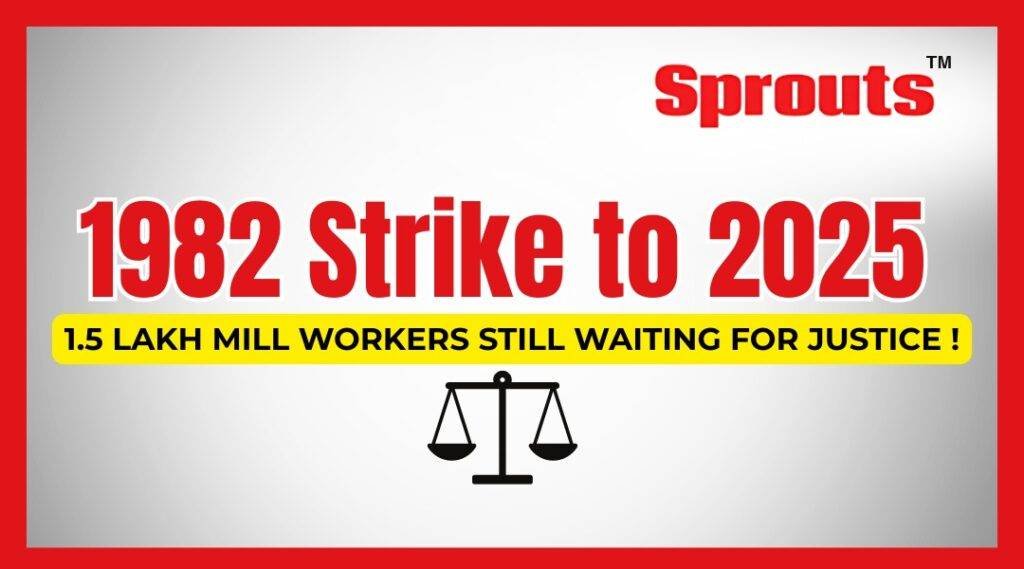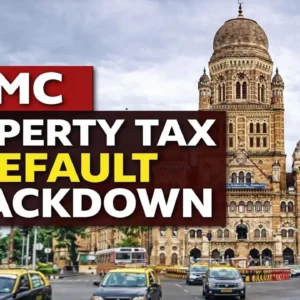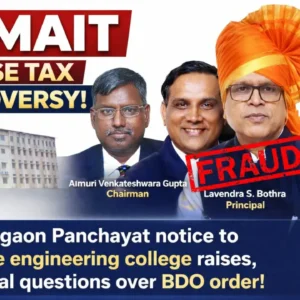1.5 Lakh Mill Workers Still Waiting for Homes
• Broken Promises on Mumbai’s Mill Lands
• MHADA Scheme Falls Short as Protests Grow
- 1.5 Lakh Mill Workers Still Waiting for Homes
- • Broken Promises on Mumbai’s Mill Lands
- • MHADA Scheme Falls Short as Protests Grow
- • Historical Role of Mill Workers in Shaping Mumbai’s Growth; Mill workers contribution to Mumbai
- • The 1982 Strike and Its Aftermath: Homes Promised, but Not Delivered; Great Bombay Textile Strike
- • MHADA’s Housing Scheme: Limited Relief for a Massive Demand; affordable housing for mill workers in Mumbai
- • Can Mumbai’s Mill Workers Be Relegated to the Suburbs? Mumbai housing policy for displaced workers
- Also Read: Ullu’s “House Arrest” Sparks Calls for OTT Censorship for Vulgarity.
- • Sprouts News Amplifies Call for Justice to Mumbai’s Mill Workers
Following the devastating 1982 textile strike, the Maharashtra government entrusted MHADA (Maharashtra Housing and Area Development Authority) with the responsibility of providing homes on mill lands to affected mill workers and their legal heirs. However, decades later, only 25,000 workers have received homes through this scheme.
The remaining 1.5 lakh mill workers and their families continue to protest, demanding fair and timely rehabilitation. Their repeated appeals underscore the long-standing failure to fully honor the commitment made to them.
• Historical Role of Mill Workers in Shaping Mumbai’s Growth; Mill workers contribution to Mumbai
The textile industry was foundational to Mumbai’s transformation into an economic powerhouse. The city’s first cotton mill, the Bombay Spinning and Weaving Company, was set up in 1854 by Kawasji Nanabhai Davar. As mills expanded, people migrated from across Maharashtra, particularly the Konkan region, to work in the city’s industrial hubs.
By 1982, over 2.5 lakh mill workers were employed across Mumbai. These workers played a vital role not only in economic terms but also in social and political movements, including India’s independence and the Samyukta Maharashtra campaign. Of the 106 martyrs in that movement, 23 were mill workers.
• The 1982 Strike and Its Aftermath: Homes Promised, but Not Delivered; Great Bombay Textile Strike
On January 18, 1982, driven by demands for higher wages and bonuses, mill workers went on strike. Led by union leader Dr. Datta Samant, the movement came to be known as the “Great Bombay Textile Strike.” Nearly 2.5 lakh workers from 65 mills participated, making it one of the most significant labor actions in India’s post-independence history.
The strike lasted almost a year, and many mills shut down permanently. Workers were left unemployed and forced into unstable livelihoods. This economic dislocation sparked widespread calls for government intervention, including demands for housing on the mill lands where they had worked for decades.
• MHADA’s Housing Scheme: Limited Relief for a Massive Demand; affordable housing for mill workers in Mumbai
In the early 2000s, the Congress-led Maharashtra government announced that one-third of land from defunct mills would be used to build free housing for mill workers. MHADA’s Mumbai Board was assigned the task of construction and allotment.
The housing lotteries began in 2012, with 6,925 homes offered across eight mill sites. In 2016, 2,500 more homes were allotted, followed by another 3,894 homes in 2020. While advertised as “free,” the state charged mill workers around ₹7.5 lakh per unit—placing a significant financial burden on many.
With limited city land, the government also decided that 50% of rental homes developed by MMRDA would be reserved for mill workers. In 2020, a draw for approximately 2,500 such homes was held, with another 2,500 units expected soon. Yet this still leaves over 1.5 lakh workers without any clear housing solution, raising urgent policy questions.
• Can Mumbai’s Mill Workers Be Relegated to the Suburbs? Mumbai housing policy for displaced workers
To qualify for the scheme, MHADA invited applications twice, receiving nearly 1.75 lakh submissions. However, only 25,000 mill workers could be accommodated within Mumbai’s city limits due to land scarcity. This imbalance continues to fuel anger and mobilization among workers and their unions.
Amid major redevelopment projects like Dharavi being handed to corporate entities like the Adani Group, worker associations question why no land is being reserved for them. Some unions have demanded that salt pan lands be allocated for mill worker housing.
In response, the government recently approved the construction of 81 homes in distant suburbs like Shelu and Vangani. However, this move has been criticized. Workers insist that any meaningful rehabilitation must occur within Mumbai itself, not on the outskirts.
Also Read: Ullu’s “House Arrest” Sparks Calls for OTT Censorship for Vulgarity.
• Sprouts News Amplifies Call for Justice to Mumbai’s Mill Workers
As government policies continue to sideline the original builders of Mumbai’s economy, the demand for inclusive urban planning grows stronger. Mill workers’ heirs have once again taken to the streets, urging the government to fulfill its promise.
Sprouts News has consistently highlighted this critical issue—echoing the voices of those left behind by rapid urban development. Ensuring dignified housing for Mumbai’s mill workers is not only a matter of justice but also of preserving the city’s industrial legacy.


















